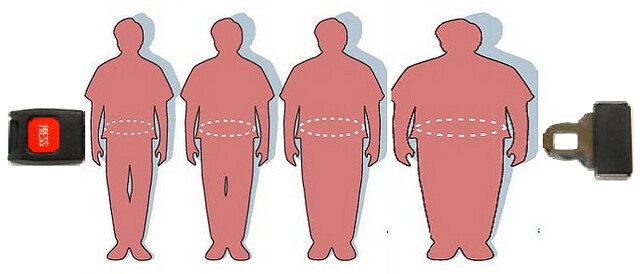Obesity is an increasingly common issue in our society today. It currently affects over one-third of adults and 17% of children in the United States alone. As more people become obese, health care professionals are beginning to recognize it as a chronic disease that requires long-term management. Treating obesity as a disease allows for more effective interventions and better management of associated conditions, such as cardiovascular disease and diabetes. Treating obesity as a medical condition also gives individuals access to treatments that could not be obtained through other means. These treatments can range from lifestyle modifications like dietary changes to medications or even surgery if deemed necessary by a health care professional. Additionally, recognizing obesity as a disease helps reduce any stigma or discrimination associated with being overweight or obese, allowing individuals to focus on their overall health instead of the number on the scale.
Causes of Obesity
Obesity is a major concern in today’s society, with an increasing number of people facing health issues related to it. While obesity can certainly be treated, it is important for us to understand what leads to this serious condition in the first place. Causes of obesity can be divided into two main categories: lifestyle and genetics. When it comes to lifestyle factors, unhealthy dietary habits are at the top of the list. Regular consumption of foods high in sugar and fat, along with a lack of physical activity, can lead to gradual weight gain over time that eventually results in obesity. Other lifestyle-related causes include emotional eating and stress eating — behaviors that often occur as coping mechanisms for underlying mental health problems such as depression or anxiety.
Health Risks of Obesity
Obesity is a persistent and growing problem in the United States. The Centers for Disease Control and Prevention estimate that more than one-third of adults in the United States are obese – a figure that continues to rise each year. Unfortunately, obesity has serious implications on the health of those affected, with risks ranging from hypertension and heart disease to type 2 diabetes and asthma. It is clear that treating obesity as a medical condition is vital to reducing these troubling health risks. The American Medical Association recently recognized obesity as a disease state,” which could help put an end to long-standing stigma around weight issues and provide greater access to treatments like diet modification, medication, or even surgery. This recognition also highlights the urgent need for healthcare providers to consider both physical health risks as well as psychological factors when developing treatment plans tailored to each individual patient’s needs.

Diagnostic Criteria
Diagnostic criteria are essential to successfully treating obesity as a disease. The World Health Organization (WHO) has developed a set of criteria to signify when individuals should be diagnosed with obesity. As per the WHO, a diagnosis of obesity is made when an adult’s body mass index (BMI) is 30 or higher. In children and adolescents aged between 5 and 17 years, BMI needs to be above the 95th percentile for their age group in order for them to receive an obesity diagnosis. Additionally, waist circumference measurements can also be used to diagnose certain types of obesity if BMI measurements cannot provide sufficient accuracy.
Treatment Options
The World Health Organization recently declared obesity as a disease. As a result, medical professionals have been researching and developing new treatment options to fight this life-threatening condition. Obesity can lead to numerous physical and mental health issues, making it important for those affected to seek proper care and treatment. One common approach is lifestyle modification therapy, which focuses on changing behaviors and adopting healthier habits. This includes reducing food intake, increasing physical activity levels, drinking more water, managing stress levels, sleeping more soundly and more. These changes in behavior can help individuals reduce their weight through healthy dieting practices as well as exercise routines that work for them specifically. Another option is medication management therapy; although this should be used in combination with lifestyle modifications for the most effective results.
Barriers to Treatment
Obesity is a growing health crisis across the United States, with over 40 percent of adults and nearly 20 percent of children and adolescents classified as obese. Despite its prevalence, there are numerous barriers to treating obesity as a disease. First and foremost, many insurance plans do not cover or have limited coverage for certain treatments related to obesity such as bariatric surgery or behavioral counseling. Additionally, since it is difficult to diagnose and measure the progress of treating obesity, many physicians may be reluctant to diagnose it in their patients due to lack of reimbursement from insurance companies. Another major barrier is stigma around the condition; often times individuals who are affected by obesity face social judgment which prevents them from seeking out help or treatment options.

Prevention Strategies
Despite numerous treatments available to those struggling with obesity, prevention strategies have not been as widely discussed. Prevention is key to stopping the wave of obesity that has taken over our nation, but there are several methods that can be employed for people to take a proactive stance in their own health. A balanced diet and regular exercise are two essential components when it comes to maintaining a healthy weight. Incorporating fruits, vegetables and whole grains into daily meals helps ensure proper nutrition while limiting processed foods can reduce empty calories from entering the body. Additionally, physical activity should be incorporated into daily routines; even small exercises like taking walks or riding bikes can go a long way in helping maintain an ideal weight level.
Addressing Obesity
Recent research suggests that treating obesity as a disease may be the most effective way forward. This article examines the potential benefits of recognizing obesity as a disease for both individuals and society. The primary benefit of classifying obesity as a disease is that it encourages people to seek help for their weight issues before they become severe. With acknowledgement from healthcare providers, those afflicted by obesity can access treatment options such as lifestyle changes, medications, and surgery more readily than if it were not considered a disease. This would also open up opportunities for insurance coverage and financial support which are currently not available.

